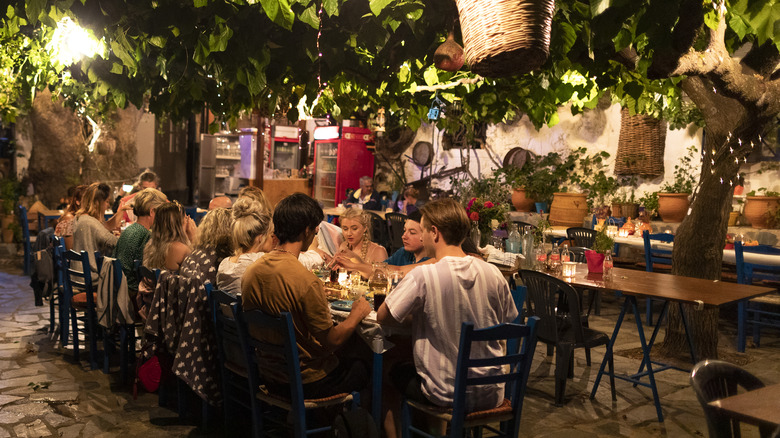Dinner Time In Greece Is A Nocturnal Event
When it comes to mealtime in Greece, get ready to throw out any preconceived notions you have about eating early to digest your food before bed. Unlike many parts of the world, where dinner is a prompt affair, in Greece, mealtime is a leisurely, nocturnal event.
Speaking with Food & Wine, Aby Saltiel, the co-owner of the hotel Kalesma Mykonos, admitted (and joked) that dinner in Greece is enjoyed "Late, very late, almost vampire time."
While most restaurants in Greece might re-open in the evening around 7 p.m., the locals know that dinner won't be served until much later, around 10 p.m. or later. And while it may seem strange to some outsiders that mealtime is pushed back so far into the night, the Greeks have their reasons.
However, it's not just the timing and content of the meal that's unique to Greece. The spoken and unspoken rules surrounding mealtime differ vastly from those in the United States and other European countries. In Greece, mealtime is a communal affair, often taken around a table with friends and family, where socializing can last long into the night.
Still, why is the nocturnal mealtime scene so prevalent in Greece? Here's what to know so you can learn how to forget about your watch and let dinner time in Greece take you on a culinary journey (if you can stay up that late).
Why is dinner so late in Greece?
For starters, the weather in Greece can be quite hot during the day. So instead of trying to brave the day's heat over some fresh octopus or mouthwatering moussaka, Greeks have their meal in the evening when the temperatures have cooled. This made sense when the first formal Greek state was formed, and the country was primarily agriculturally based. Families worked from dawn to dusk and had no choice but to enjoy their evening meals late into the night.
Perhaps, however, it's the fact that leisurely meals are woven into the fabric of Greek society. For them, dining isn't just about feeding the belly; it's a chance to relax, unwind, and socialize with loved ones over copious amounts of wine and food. The ancient Greeks believed that dining was a sacred act, a time to connect with others and exchange ideas (it was these beliefs that led them to invent bars).
"Life will happen in Greece when we are all at the table," wrote Susanna Tee in her book "World Food: Greece." Indeed, it does. There's even a word for this uniquely Greek concept of leisurely dining: symposium. And while modern Greece may have evolved beyond some of those ancient traditions, the essence remains the same: dinner is a time for connection, laughter, and, of course, a healthy dose of delicious food.
How to enjoy dinner like a real Greek
As you've hopefully learned, dinnertime in Greece is a grandiose social event, a symphony of flavors, and an opportunity to relish the company of those you love. Aside from forgetting about timing, how can you learn how to dine like a true Greek?
First, you can forget about indulging in a big breakfast and instead should wait for brunch. Aby Saltiel told Food & Wine that while breakfast is a hot-button topic in Greece, "Greeks enjoy 'brunches' all over, just like everybody else in the world..."
As the afternoon turns to evening, sample some traditional Greek wine, spirits, and liqueurs. Ouzo is an excellent place to start; this anise-flavored liquor has been a staple of Greek dining for centuries. Drink it over ice and sip it slowly before the meal. Or pair a nice glass of Greek red wine with saganaki, delectable Greek fried cheese.
While sipping on your libation of choice, remember that Greek meals are often served family-style, with multiple dishes spread out over several courses. Indulge in classic dishes like souvlaki or pastitsio, and don't miss out on trying some traditional meze dishes like tzatziki or dolmades.
If you're after a leisurely dining experience characterized by lively conversation, shared plates, and a relaxed vibe, Greece is the perfect destination.


